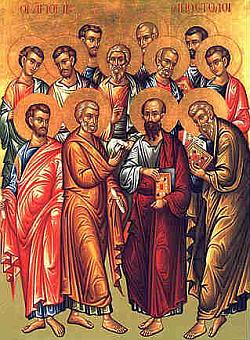Sometimes, there’s just not enough in an idea for a full post. Sometimes, there’s almost too much, and the only recourse is a brief overview lest the topic overwhelm my ability to write. On such days, the best option is a series of post vignettes offered up for reader input. Feel free to fire away at any of these musings.
***
Is it me, or has much of contemporary worship music become more tribal and chant-like? I find a lot of this stuff tuneless and unsingable. First there was the charge that the lyrics were shallow. Now the melody is. When the Vineyard Churches energized modern worship music back in the late ’80s and early ’90s, the songs had lovely melodies. I dare you to find the melody line in more recent songs.
***
Sermon topics I have not heard preached in years:
The Fatherhood of God
The Humanity and Divinity of Jesus Christ
Repentance
Holiness: Why God Demands It, and What It Looks Like in Modern Living
Hmm. Weren’t those once considered foundational?
***
Conservative Christians are always accusing liberal Christians of a self-help, Oprah-esque form of the Faith that owes more to Jung than Jesus. But conservative Christians fall into their own ditch: sanctifying business solutions and calling them “spiritual wisdom.” Frankly, both are in error.
***
Kevin DeYoung has a new book, Crazy Busy: A (Mercifully) Short Book about a (Really) Big Problem, that seeks to address the frantic nature of contemporary life. I have not read the book, but from what I have read about it, DeYoung seems to throw the solution back onto the individual. I keep wondering when Christians are going to wake up and start challenging the entire system of how we live rather than trying to get individuals to modify their behavior to better work within that system. There’s only so much behavior modification one person can do. But then, show me Christians with a national platform who are willing to speak against the entire system of how we live, work, and play in America, and I’ll show you the one hand I can count them on.
These prepackaged, prefilled communion cup + wafer thingamabobs are just…well, words fail me. Nothing says prepackaged, prefilled, consumerized American spirituality more than those things. I dare anyone to partake of such a consumer good and soberly recall Jesus’ words that this is His body and His blood. Can you say that this is true of such a “communion meal”? Does this resemble the communion meal in the Scriptures in any way? In the end, what does it say about the Lord?
***
Jake Meador wrote “Why We Need Small Towns” for Christianity Today. I live in a small, rural town of about 3,100 people, and I have for the last dozen years. Heck, my son was off from school all last week because so many kids are involved in the county fair, there’s no point in having school. I can say without hesitation that Meador has over-romanticized the benefits of small town life. In truth, most small towns are no better than the suburbs, and in some ways, they have all the same problems but with fewer solutions. Most churches in a small town regret being churches in a small town, with their eyes forever on that suburban megachurch as their pined-for model. Really, I have no clue what Meador is talking about.
***
Tim Challies tried his best to bring some sense to John MacArthur’s Strange Fire Conference. He is braver than I am. As a charismatic, what bothers me most about this conference is the number of ways MacArthur and his select speakers could address the “charismania” issue, yet it seems they are going the most inflammatory route, one certain to cheese off charismatics everywhere, no matter how orthodox those charismatics might be. If the conference truly was about restoring sanity to the ranks of charismaniacs, then where are the solid charismatic speakers MacArthur has partnered with in this effort? You say there are none in the speaker list? Hmm…
***
Over at Patheos, Peter Enns wonders if there is wisdom in using the writings of contemporary “spiritual” authors (the kind Oprah—there she is again—would endorse) to jumpstart conversations with lost people about Jesus. Looking over the Bible, I guess I’m at a loss as to where the Apostle Paul recommends that Christians read the liturgy of Molech with lost people before talking with them about Jesus.
***
I used to be able to talk to fellow Christians about any topic. We could even skewer each other’s sacred cows and both laugh and think more deeply about the possible flaws in our own thinking. Today, everyone walks on eggshells, every discussion of personal belief follies descends into battles and hurt feelings, and nothing seems to get better. We are all so caught up in our own stuff that we are all heading toward prideful unteachability—if we are not already there.
***
Every last one of us needs an infusion of genuine, Christ-like humility.


